Gardeners often ask, “Why does my soil smell?” Fresh soil gives off a pleasant, earthy smell. But if the dirt of your indoor or outdoor plants has a foul odor, that’s not normal. So what causes the soil to smell bad?
Foul odor in the soil is often caused by overwatering, improper drainage, and lack of aeration. Bacterial or fungal contaminations in the soil or the use of under-processed manure can also create an unpleasant smell in soil.
If your soil smells bad, it could indicate an underlying problem and shouldn’t be taken lightly. Continue reading to learn about the problems associated with smelly soil and how to resolve them before your plants suffer.
Why Does My Soil Smell?
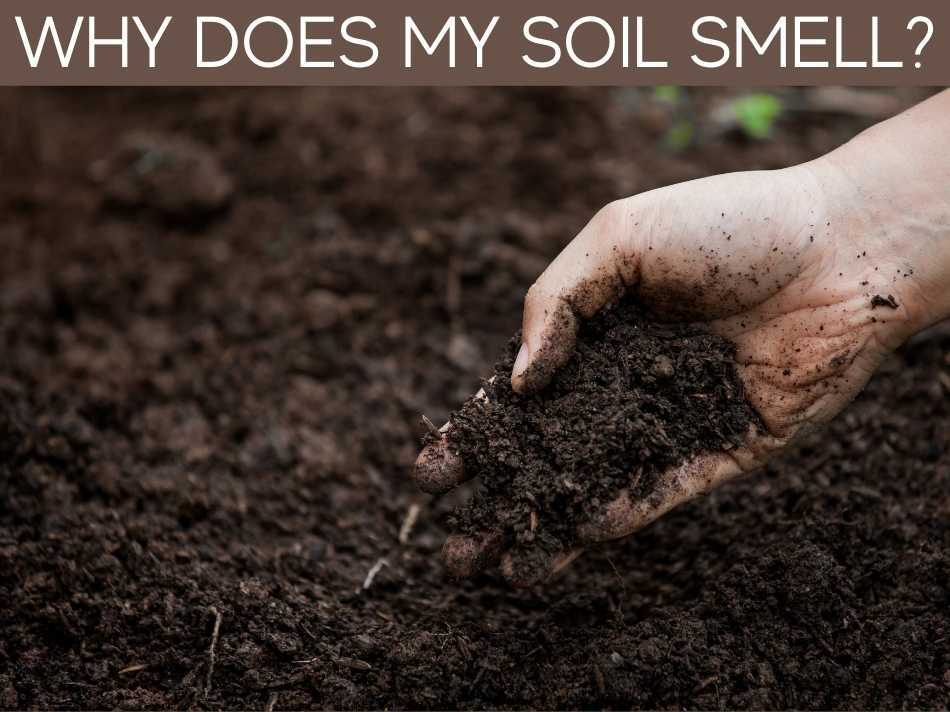
Plants consume several nutrients, including nitrogen, phosphorus, and potassium.
These nutrients are made available by the beneficial microorganisms in the soil that break down organic matter into simple nutrients that plants can absorb.
These healthy activities within the soil layers give it the natural, earthy smell we are fond of.
Bad-smelling soil is typically indicative of anaerobic soil – soil that lacks oxygen.
So how is anaerobic soil a problem?
Overwatering induces soil compaction, reducing the number of air pockets so that the environment becomes anaerobic rather than aerobic. Anaerobic soil diminishes the activity of healthy microbes and harbors anaerobic bacteria that are harmful to the plants and give off a bad smell.
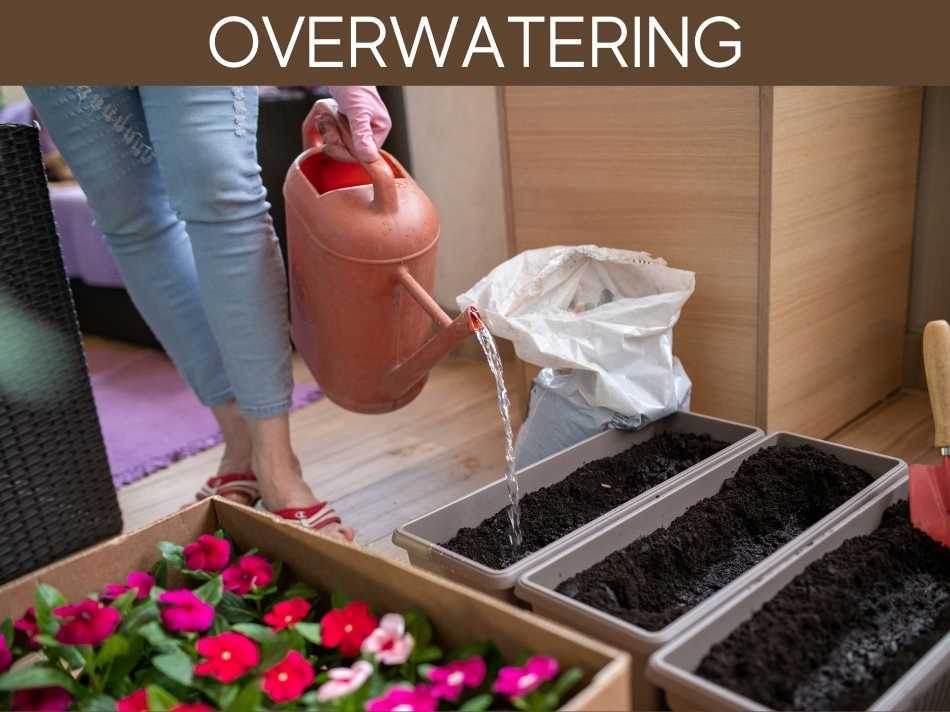
Other than promoting unhealthy bacteria that can kill plant roots, lack of aeration directly affects plant health.
The air pockets in healthy soil help the plants breathe.
Plant respiration requires oxygen from the soil, and without enough oxygen from the air pockets within the soil layers, the plants will lose vigor and, eventually, die.
It’s essential to address the problem in time before the overwatering symptoms start showing up on plants.
Find out if you soil might be hydrophobic (and how to fix it).
Why Does My Houseplant Smell
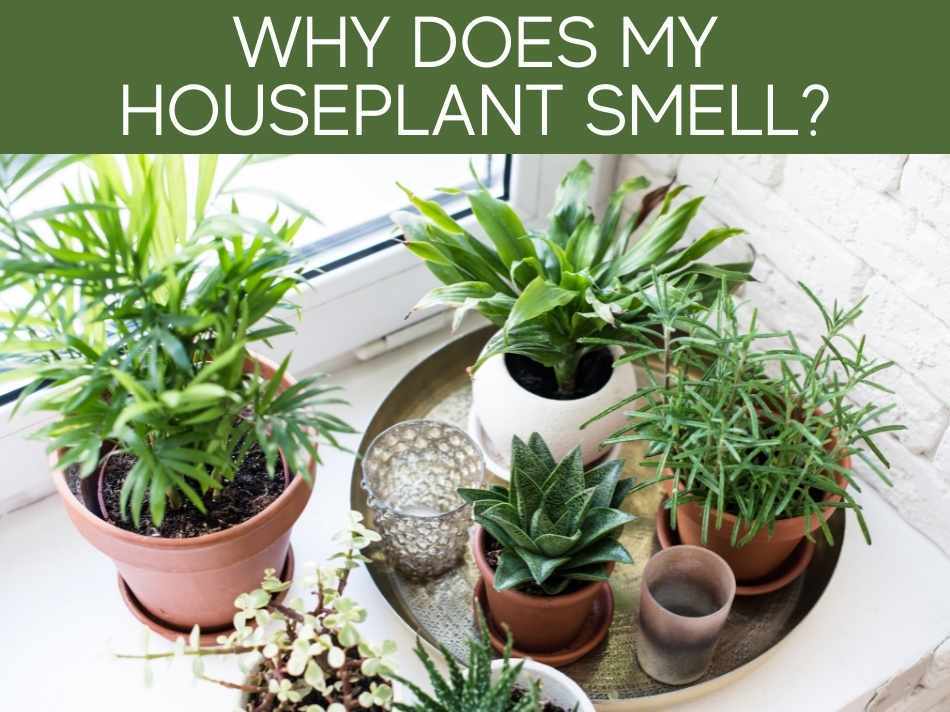
Indoor plants are fresh, appealing and add a natural attraction to your space.
However, stinky houseplants are the last thing you would want to find inside your house.
If your houseplant smells bad, overwatering is the most common reason for the problem.
The bad smell from indoor plants is indicative of one or more problems associated with overly wet soil. Lack of oxygen for plant respiration, root rot, and fungal growth are some of the problems associated with overwatering and may cause a change in the soil’s natural smell.
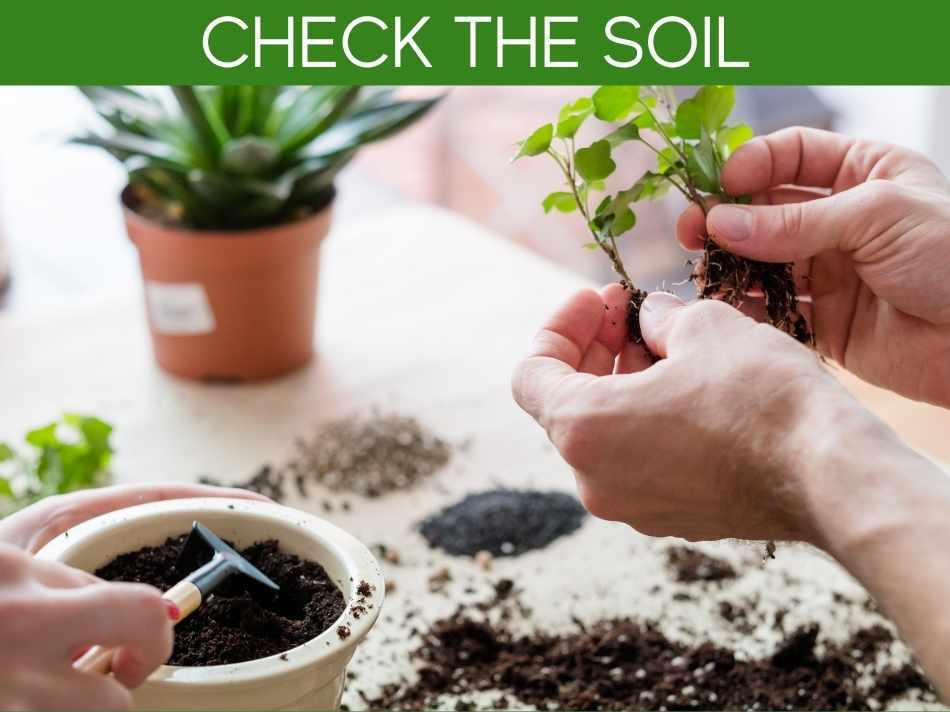
If your houseplant smells bad, check if the soil is wetter than it should be.
Empty all the excess water that’s sitting in the saucer.
Hold back watering the plant until the soil dries out.
Once you resume watering, water only enough to keep the soil moist but not wet.
If the soil smell persists, you may have to repot the plant using fresh potting soil to save the plant.
When you remove the plant from the soil, take a look at the roots.
If the roots are soft and smell, it indicates root rot. In this case, the plant is too far gone and can be discarded.
If the roots appear healthy and fresh, repotting them in new soil will boost plant vigor and eliminate the foul smell.
You might also want to check out our article on the best soil for indoor herbs.
Why Does My Soil Smell Like Poop
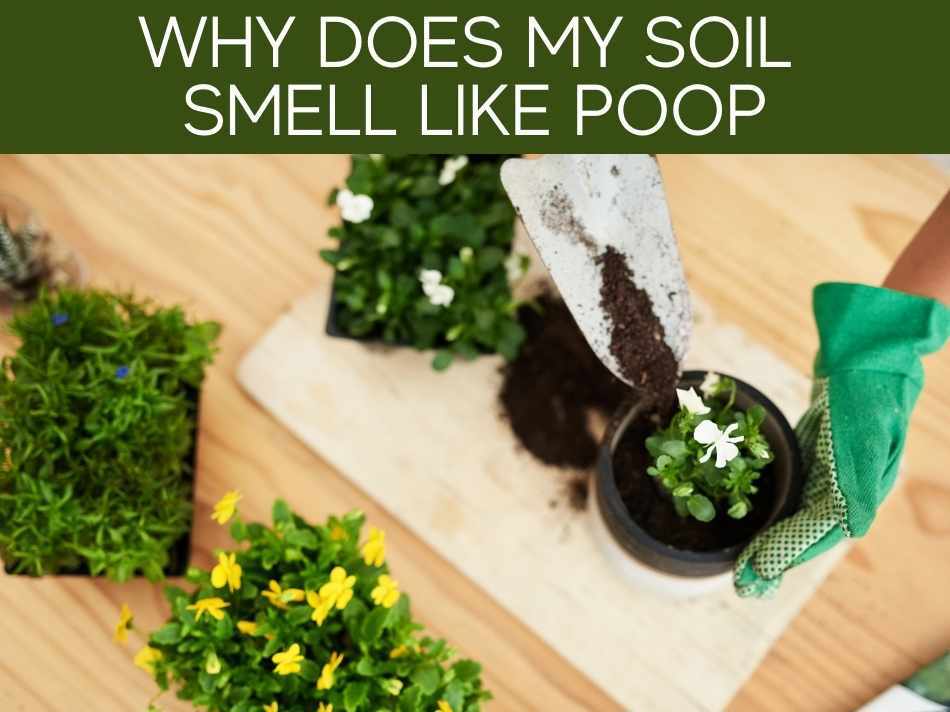
If your soil smells like poop or something with traces of ammonia or sulfur in it, that’s far from ordinary and unhealthy for your plants.
The problem is more common with potting soil.
Though the soil itself may not go bad, the ingredients that are included in the mix may have an expiration date.
Peat moss is a common ingredient of potting soil and typically only lasts for a year or two.
Since peat moss is what gives potting soil good drainage, old potting soil won’t drain well.
With overwatering, the plant is prone to root rot, fungal and bacterial infections, and mold growth, any of which could be responsible for the foul smell. In garden soil, the poop smell could also be caused by fresh or under processed manure that you might be using to fertilize the plants.
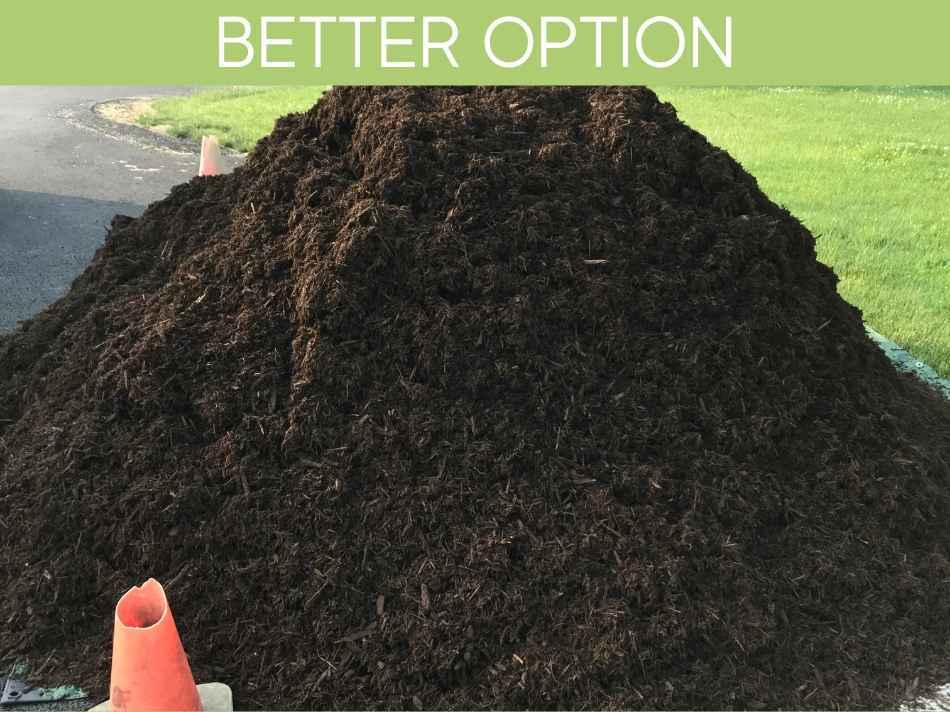
Composted manure is a better option. That’s because it doesn’t give a foul smell and contributes more organic matter to the soil than fresh manure.
Fresh manure can also contain bacteria and isn’t recommended for vegetable gardens. That’s because it may contaminate vegetables and cause diseases in humans.
You can neutralize some of the smell by spraying a little water over the affected area and sprinkling baking soda or lime over it so that it can soak in the foul-smelling soil.
Baking soda helps in making your soil smell better but is not a long-term fix.
To remove the smell for good, you’ll have to address the problem that’s causing it in the first place.
Why Does My Plant Soil Smell
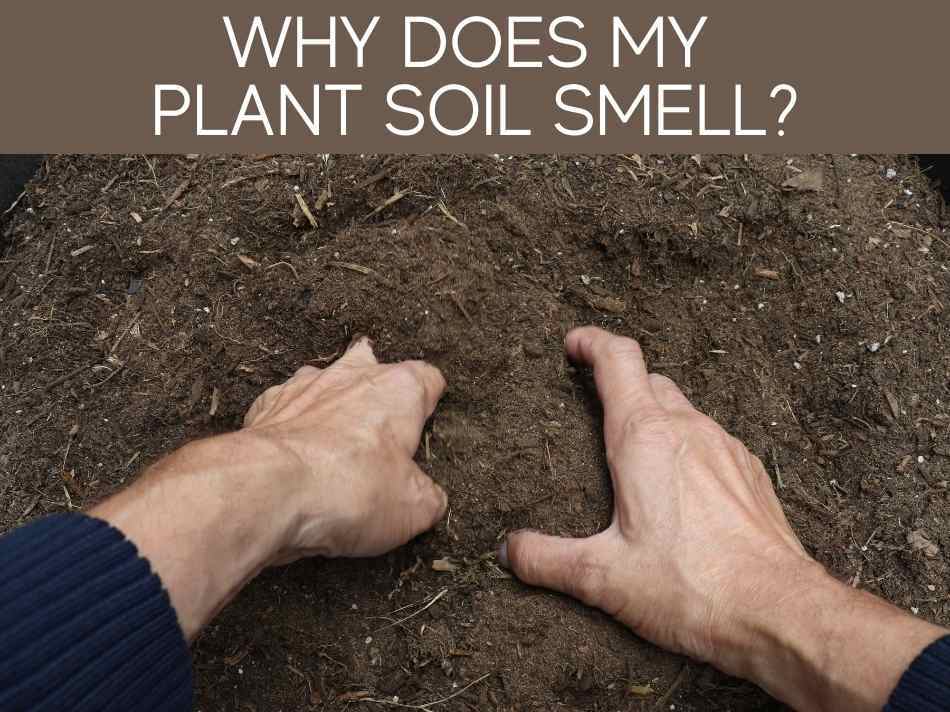
Unless you have been using underprocessed or fresh manure for fertilizing the plants, bad-smelling plant soil typically indicates root rot.
Besides the foul smell, other symptoms include yellowing leaves and wilting even after regular watering.
The foul smell from the soil, coupled with yellowing leaves, is more familiar with indoor plants and suggests that the plant receives more water than it needs. If it is not being overwatered, the reason for the symptoms can be poor drainage.
Check to see if the pot has drainage holes at the bottom.
It could also be that you are not using light, friable potting soil in the container.
Using garden soil in containers often causes waterlogging and aeration issues in the soil. That’s because the soil becomes heavier and therefore easily compacted.
An excess of water in the soil harbors unhealthy microbes, bacteria, and fungus. These can consume oxygen in the soil (which is already suffering from a shortage of air) and deprive the plant roots of the necessary oxygen.
Remove the plant from the soil to examine the roots; if the entire root system appears black and mushy, the plant is too far gone and is better off tossed away.
If a major part of the root appears fresh and firm, repotting it in fresh potting soil will save it from further damage.
Before planting in fresh soil, trim off the affected parts of the root system and dip what remains in a fungicidal solution.
Why Does My Houseplant Smell Like Rotten Eggs
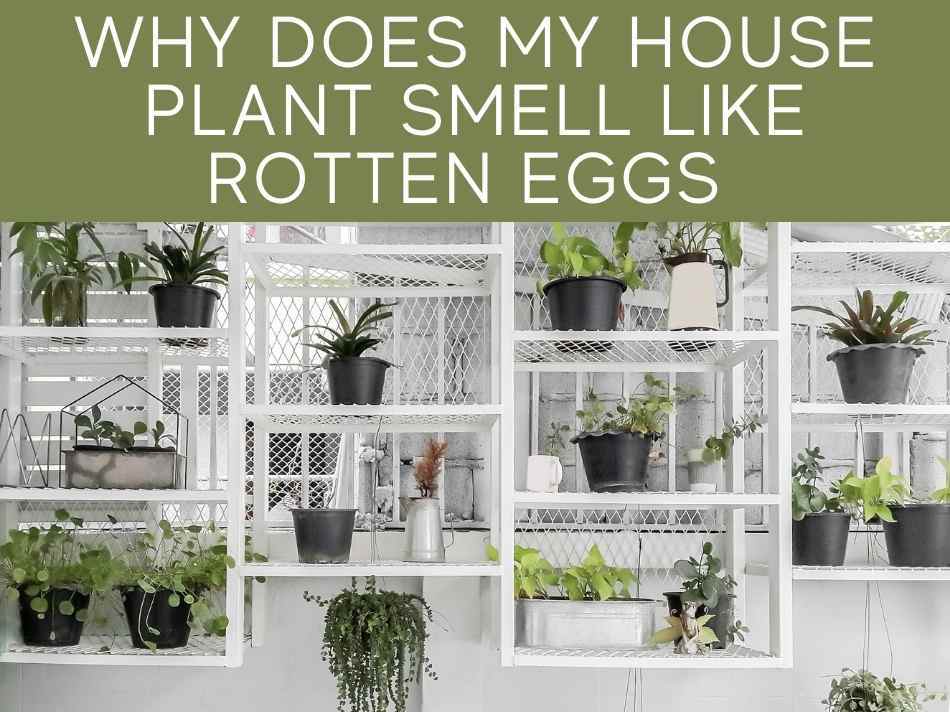
The smell of rotten eggs can be intolerable in an indoor environment.
If your houseplant smells of rotten eggs, there’s no need to worry. This is a common problem and can often be fixed with some simple solutions.
If your houseplant smells of rotten eggs, ammonium, or sulfur, it suggests that some decomposition activities are taking place within the soil layers.
The decaying smell, or the smell of rotten eggs, is caused by hydrogen sulfide, a compound released as a by-product of organic decay. Keep the potting soil clear of dead, fallen leaves, and any other debris. Also, empty the saucer at the base of the plant periodically, making sure the soil isn’t standing on stagnant water.
If the saucer at the base isn’t cleaned regularly, other than the foul smell that builds up, the chances of fungal and bacterial growth are heightened.
Mold and mildew are two common problems that result from overwatering.
Other than keeping the saucer free of standing water, preventing overwatering also helps remove the smell.
Always allow at least 2 to 3 inches of the topsoil to dry out between waterings.
Check out the complete articles on:
Why Does My Soil Smell Bad
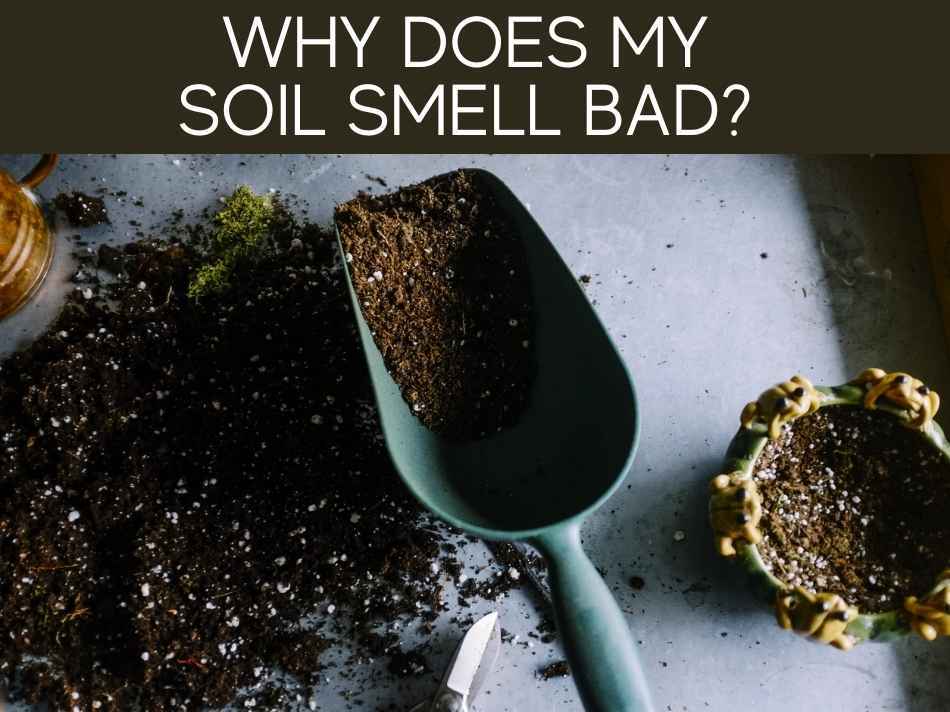
There can be multiple reasons why your soil may smell bad.
Here are some common reasons for foul-smelling soil:
- Development of moss on the potting soil
- Compacted potting soil
- Overwatering
- Use of fresh animal manure
Besides addressing the core problem to eliminate the smell and revive the plants, there are also some quick fixes that you can try to help neutralize some of the smell.
Here are some suggestions:
- Cinnamon powder: Other than neutralizing the smell, it can also keep away pests.
- Peppermint oil: The sharp, pleasant smell of peppermint oil can mask the foul smell in the soil.
- Baking soda: it won’t just neutralize the soil but will also help kill fungal contaminations in the soil.
Make sure you only use these products in controlled amounts.
Excess use can create additional problems for the plants.
Conclusion
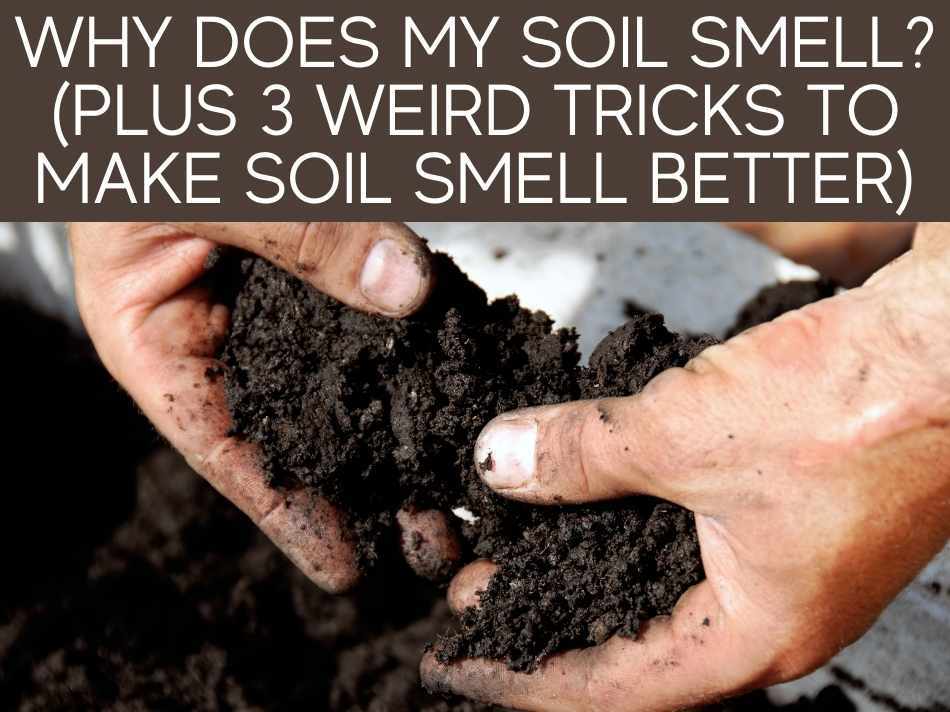
So you see that there are multiple reasons why your soil can be smelling bad instead of that lovely earthy smell you were hoping for.
Often the solution is a simple one, and the symptoms can be reversed with good gardening practices.
